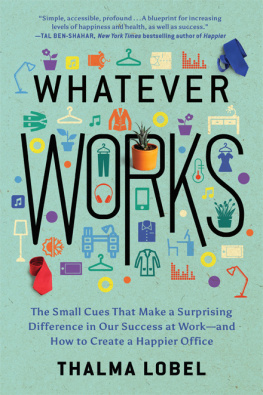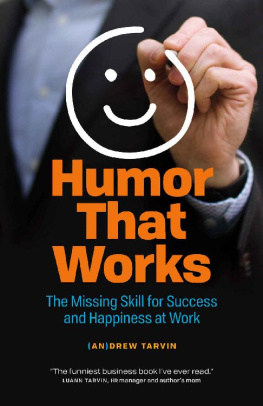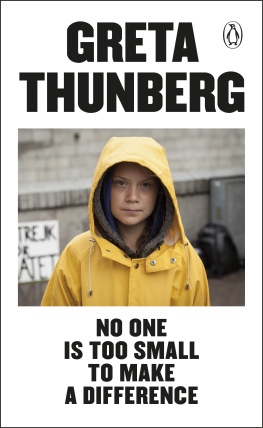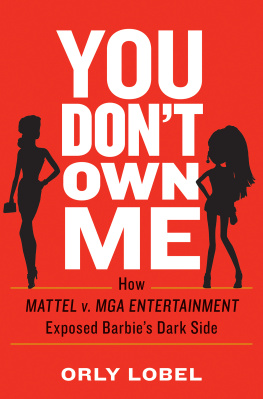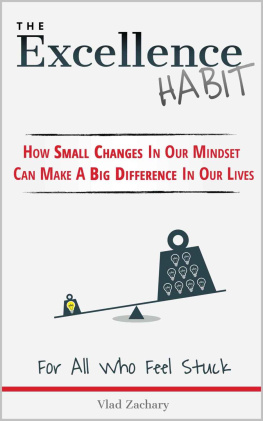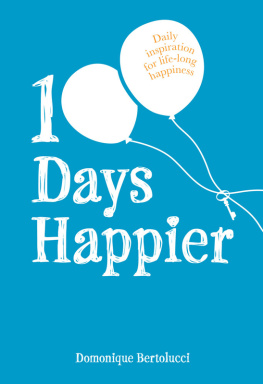Contents
Guide
Praise for Whatever Works
In Whatever Works, psychologist Thalma Lobel shares the surprising and unexpected ways small tweaks can have a big impact on our performance and success at work as well as our general job satisfaction. From mind hacks for increasing concentration to tricks for boosting creativity, there is a lot here for employers and employees alike. The great watercooler talking points alone are worth their weight in office cred. Fun, practical, and important!
Guy Winch, author of Emotional First Aid and three-time TED Talk speaker
Simple, accessible, profound. This book will help you introduce small changes to your environment that can make a big difference in your life. Thalma Lobel provides a blueprint for increasing levels of happiness and health, as well as success.
Tal Ben Shahar, New York Times bestselling author of Happier
Whatever Works challenges the notion that anything works. It presents a wonderful opportunity of using a growing body of research in an effort to improve life and work in simple but very effective ways.
Efrat Dagan, head of talent at Next Insurance and former head of talent at both Google and Lyft
Professor Lobel has written a quite unputdownable, highly accessible, and personal book. The range of topics covered is very wide and she weaves together studies from many different areas of psychology. Most important, the book is strongly evidence-based, which reflects her wide and critical reading. The book rejoices in counterintuitive findings and certainly leads you to rethink many of the things you experience in the workplace. This will definitely be a bestseller!
Adrian Furnham, author of 50 Psychology Ideas You Really Need to Know and professor of psychology at University College London

Also by Thalma Lobel
Sensation: The New Science of Physical Intelligence

Whatever Works copyright 2020 by Thalma Lobel
All rights reserved. No part of this book may be used or reproduced in any manner whatsoever without written permission of the publisher, except in the case of brief quotations embodied in critical articles or reviews.

BenBella Books, Inc.
10440 N. Central Expressway
Suite 800
Dallas, TX 75231
www.benbellabooks.com
Send feedback to
BenBella is a federally registered trademark.
First E-Book Edition: July 2020
Library of Congress Control Number: 2019059830
ISBN 9781950665099 (paperback)
ISBN 9781950665266 (electronic)
Editing by Claire Schulz
Copyediting by Scott Calamar
Proofreading by Dylan Julian and Christine Florie
Indexing by WordCo Indexing Services, Inc.
Text design and composition by PerfecType, Nashville, TN
Cover design by Faceout Studio, Molly von Borstel
Cover images Shutterstock / Paladin12 (texture), Rido (red tie), and Africa Studio (blue tie); the Noun Project (icons); and (c) Pexels / Jeri Tovar (plant)
Select chapter icons Noun Project: Door by Mooms, Handshake by Susannanova, Speech bubble by howadesign, Pickpocket by Proletkult Graphik, Eye by Petr Papasov, and Drawing by Scott Kennedy
Printed by Lake Book Manufacturing
Distributed to the trade by Two Rivers Distribution, an Ingram brand
www.tworiversdistribution.com
Special discounts for bulk sales are available. Please contact .
To my beloved son Dani
And to my beloved Danielle, Elinor, Natalie, Dean, Libby, and Adam
CONTENTS
W ork. Its a fact of life. Between the twin pillars of birth and death, most of us work.
According to a 2018 report by the US Bureau of Labor Statistics, the average man worked 40.8 hours per week in paid employment, while the average woman worked 36.2 hours per week. Add to that the commute and other necessary activities for holding down a job, and you end up with a huge chunk of your waking hours devoted to work.
Aside from sustaining ourselves and our families, work is a massive determinant of our identities. The most common question heard when strangers meet (once the names have been dispensed with) is: So what do you do? The question is universally understood to mean What work is it that you do? The response received evokes a cluster of assumptions about the other person and, whether we like it or not, is a marker of social status.
For the lucky among us, work can be a source of great satisfaction, prestige, pride in accomplishment, and a handsome income. On the other hand, for the less fortunate who have no choice, work can be little more than a quotidian duty that takes up a large chunk of the day, and little more. But no matter which of the extreme camps we belong to, or where we lie along the continuum, it is natural that we should wish to increase our job satisfaction and well-being, boost our performance, enhance our creativity, gain recognition, and advance in our careers. This holds true for individual workerswhether as freelancers working alone or as salaried employeesas well as for business owners, organizations, and managers who wish to optimize and incentivize their workforce and thus maximize their bottom lines.
You might ask: Another self-help book on success in ones work and career? Really? Well, not really. The vast majority of books focus on one obvious and important subject, methodically laying out its secrets and conclusions. For instance, there are books on changing ones mental attitude and mindset as keys to success. There are books on motivation and books that emphasize human relationshipsthe people we know and those who we reach out toas springboards to success in our careers. And there are plenty of niche books that address achievement from narrower angles such as dressing for success, career advancement for women, body language, and so forth.
All of these are wonderful and valuable books, but many of them tend to focus on more obvious factors like harnessing motivation, getting organized, networking, and so on. This book is different.
Based on cutting-edge science and novel experiments, Whatever Works focuses on elements that we are less aware ofand even if we are aware of them, we often dont think they matter. These are factors, such as clothing and lighting, that are there all along, virtually under our nose, but that we are less aware of, or whose effects we might have only given a passing acknowledgment to without digging down. Yet they influence our performance, satisfaction, and happiness. The experiments Ill describe in this book uncover unexpected truths about subtle cues in our environments, our teams, and our personal habits. The vast majority of these discoveries are related to the space we work in, some are in our mindset, and some are powerful cues that were hitherto ignored or unknown. Many are truly surprising, and some even challenge our beliefs to the point of saying: Come on, that cant be true. However, the scientific proof in these cases is inescapable.
For example, much has been written about clothes and dressing for success. But did you know that dressing in a certain way can increase your cognitive powers? Or that what you wear can distort objective professional assessments of your performance?
Next page
